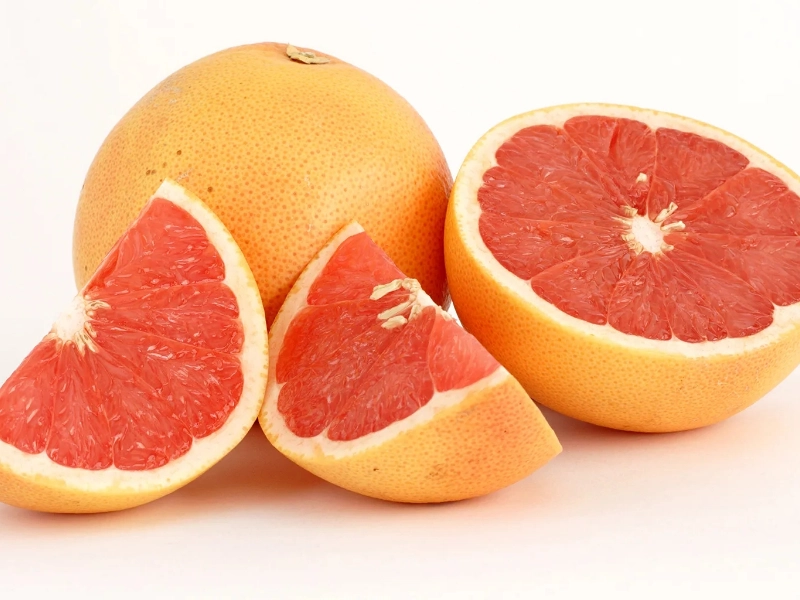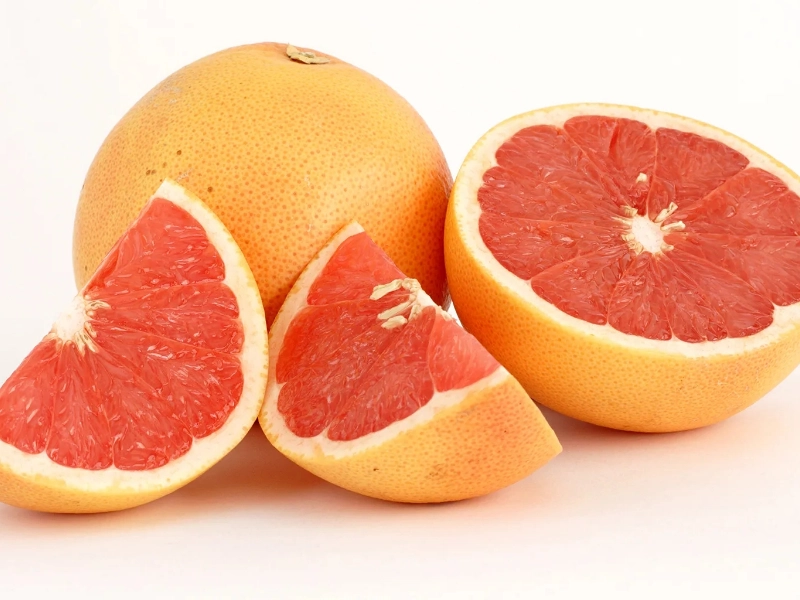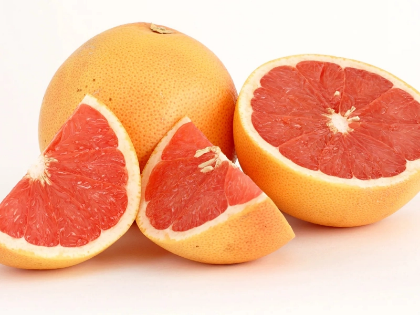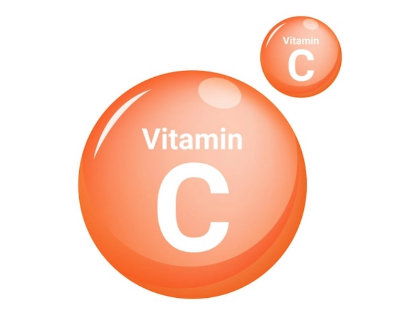The Antioxidant Power of Grapefruit: Fighting Free Radicals
Advertisement
1. Appreciating Free Radicals

Advertisement
 One citrus fruit well-known for its tart taste and reviving effect is grapefruit. It is a good supplement to any diet since it has few calories and plenty of important minerals and vitamins. Particularly high in vitamin C, a potent antioxidant shielding cells from oxidative damage, is grapefruit. Its antioxidant qualities also depend on other useful molecules such as lycopene and flavonoids. Knowing grapefruit's nutritional profile helps one to appreciate its value in combating free radicals and supporting general health.
3. Grapefruit's Vitamin C Content: Particle Action
One citrus fruit well-known for its tart taste and reviving effect is grapefruit. It is a good supplement to any diet since it has few calories and plenty of important minerals and vitamins. Particularly high in vitamin C, a potent antioxidant shielding cells from oxidative damage, is grapefruit. Its antioxidant qualities also depend on other useful molecules such as lycopene and flavonoids. Knowing grapefruit's nutritional profile helps one to appreciate its value in combating free radicals and supporting general health.
3. Grapefruit's Vitamin C Content: Particle Action
 One of the most well-known antioxidants is vitamin C; hence, grapefruit is a great source of this essential vitamin. By neutralizing free radicals and thereby stopping cellular damage, it significantly helps the body to withstand oxidative stress. Moreover, collagen synthesis depends on vitamin C, so supporting skin condition and wound healing. Frequent grapefruit intake can guarantee enough vitamin C levels, therefore improving the body's capacity to fight oxidative stress and preserve general health.
4. Flavonoids: Natural Strong Antioxidants
One of the most well-known antioxidants is vitamin C; hence, grapefruit is a great source of this essential vitamin. By neutralizing free radicals and thereby stopping cellular damage, it significantly helps the body to withstand oxidative stress. Moreover, collagen synthesis depends on vitamin C, so supporting skin condition and wound healing. Frequent grapefruit intake can guarantee enough vitamin C levels, therefore improving the body's capacity to fight oxidative stress and preserve general health.
4. Flavonoids: Natural Strong Antioxidants
 Apart from vitamin C, grapefruit is high in flavonoids, a class of plant chemicals distinguished for their antioxidant qualities. Grapefruit's flavonoids, naringenin and hesperidin, assist in lowering inflammation and shielding against oxidative stress. By raising blood circulation and decreasing cholesterol, these substances have been demonstrated to enhance heart health. Grapefruit inclusion into the diet helps people to get the preventive properties of these strong antioxidants.
5. Lycopene: Their Health Advantages
Apart from vitamin C, grapefruit is high in flavonoids, a class of plant chemicals distinguished for their antioxidant qualities. Grapefruit's flavonoids, naringenin and hesperidin, assist in lowering inflammation and shielding against oxidative stress. By raising blood circulation and decreasing cholesterol, these substances have been demonstrated to enhance heart health. Grapefruit inclusion into the diet helps people to get the preventive properties of these strong antioxidants.
5. Lycopene: Their Health Advantages
 Another strong antioxidant found in grapefruit—especially the pink and red varieties—is lycopene. Known for its ability to fight oxidative stress, this carotenoid has been connected to many health advantages, including a lower risk of some malignancies and heart disease. Lycopene supports general health and well-being by helping shield cells from free radical damage. Regular grapefruit consumption helps people boost lycopene levels and strengthen their body's defenses against oxidative damage.
6. Grapefruit and Skin Conditioning
Another strong antioxidant found in grapefruit—especially the pink and red varieties—is lycopene. Known for its ability to fight oxidative stress, this carotenoid has been connected to many health advantages, including a lower risk of some malignancies and heart disease. Lycopene supports general health and well-being by helping shield cells from free radical damage. Regular grapefruit consumption helps people boost lycopene levels and strengthen their body's defenses against oxidative damage.
6. Grapefruit and Skin Conditioning
 Grapefruit's antioxidant qualities go beyond internal wellness; they also are quite important for preserving good skin. Free radicals hasten skin aging and aggravate disorders, including UV damage and wrinkles. Grapefruit's great vitamin C concentration aids in the synthesis of collagen, therefore enhancing skin suppleness and smoothness. Furthermore, a great friend in skincare regimes, grapefruit's antioxidants help shield the skin from UV damage and environmental toxins.
7. Grapefruit's Effects on Immune System Function
Grapefruit's antioxidant qualities go beyond internal wellness; they also are quite important for preserving good skin. Free radicals hasten skin aging and aggravate disorders, including UV damage and wrinkles. Grapefruit's great vitamin C concentration aids in the synthesis of collagen, therefore enhancing skin suppleness and smoothness. Furthermore, a great friend in skincare regimes, grapefruit's antioxidants help shield the skin from UV damage and environmental toxins.
7. Grapefruit's Effects on Immune System Function
 Defense of the body against infections and disorders depends on a robust immune system. Grapefruit's antioxidants—especially vitamin C—have a major impact in promoting immune system activity. White blood cells, which are absolutely vital for combating infections, are produced in response to vitamin C. Grapefruit should be regularly consumed to boost general health and enhance the immune system, therefore lowering the risk of disease.
8. How might you include grapefruit in your diet?
Defense of the body against infections and disorders depends on a robust immune system. Grapefruit's antioxidants—especially vitamin C—have a major impact in promoting immune system activity. White blood cells, which are absolutely vital for combating infections, are produced in response to vitamin C. Grapefruit should be regularly consumed to boost general health and enhance the immune system, therefore lowering the risk of disease.
8. How might you include grapefruit in your diet?
 Grapefruit is an easy and flexible addition to your diet. Fresh, juiced, or added to salads and smoothies, it can be savored. Think about combining grapefruit with yogurt or oatmeal for a reviving breakfast. Grapefruit also lends a zesty taste to many foods when used in marinades and sauces. Including grapefruit in meals can improve its health advantages and provide diversity to the diet by means of interesting approaches.
9. Potential Interactions and Thoughtfulness
Grapefruit is an easy and flexible addition to your diet. Fresh, juiced, or added to salads and smoothies, it can be savored. Think about combining grapefruit with yogurt or oatmeal for a reviving breakfast. Grapefruit also lends a zesty taste to many foods when used in marinades and sauces. Including grapefruit in meals can improve its health advantages and provide diversity to the diet by means of interesting approaches.
9. Potential Interactions and Thoughtfulness
 Though grapefruit has several health advantages, one should be mindful of possible interactions with some drugs. Many medications' metabolism can be changed by grapefruit, which might either cause negative effects or lower efficacy. Those on drugs should see a medical practitioner before greatly increasing grapefruit intake. Knowing these interactions helps one to properly control health issues and securely enjoy the advantages of grapefruit.
10. Grapefruit's Antioxidant Power: Synopsis
Though grapefruit has several health advantages, one should be mindful of possible interactions with some drugs. Many medications' metabolism can be changed by grapefruit, which might either cause negative effects or lower efficacy. Those on drugs should see a medical practitioner before greatly increasing grapefruit intake. Knowing these interactions helps one to properly control health issues and securely enjoy the advantages of grapefruit.
10. Grapefruit's Antioxidant Power: Synopsis
 Excellent fruit with a lot of antioxidants, grapefruit is a great friend in the battle against free radicals. Its great nutritional value—including lycopene, flavonoids, and vitamin C—helps explain why it fights oxidative stress and advances general health. Grapefruit can help people retain good skin, boost their antioxidant intake, and support their immune system by being included in a balanced diet. Understanding grapefruit's antioxidant properties can enable people to make better food decisions that support their long-term health.
Excellent fruit with a lot of antioxidants, grapefruit is a great friend in the battle against free radicals. Its great nutritional value—including lycopene, flavonoids, and vitamin C—helps explain why it fights oxidative stress and advances general health. Grapefruit can help people retain good skin, boost their antioxidant intake, and support their immune system by being included in a balanced diet. Understanding grapefruit's antioxidant properties can enable people to make better food decisions that support their long-term health.
Advertisement
Advertisement








